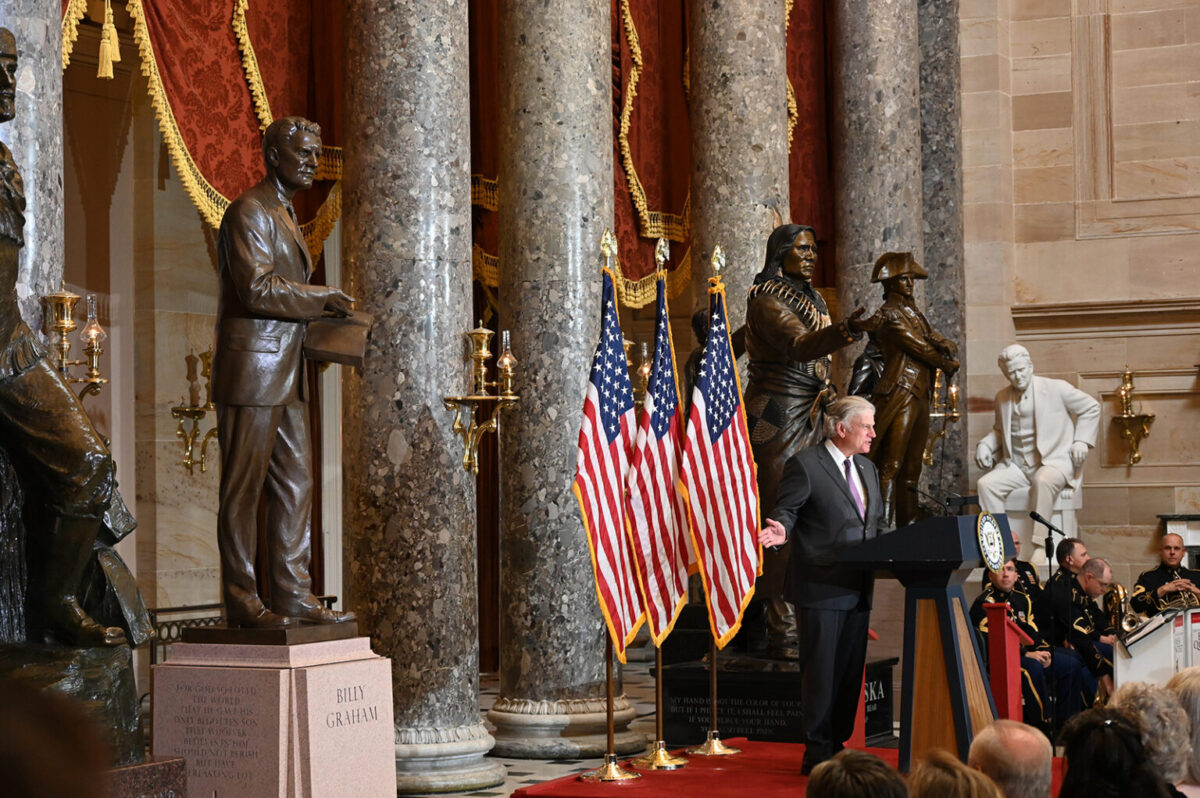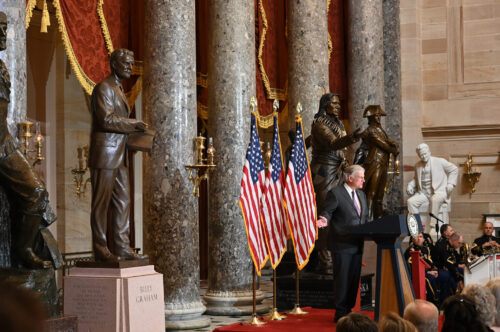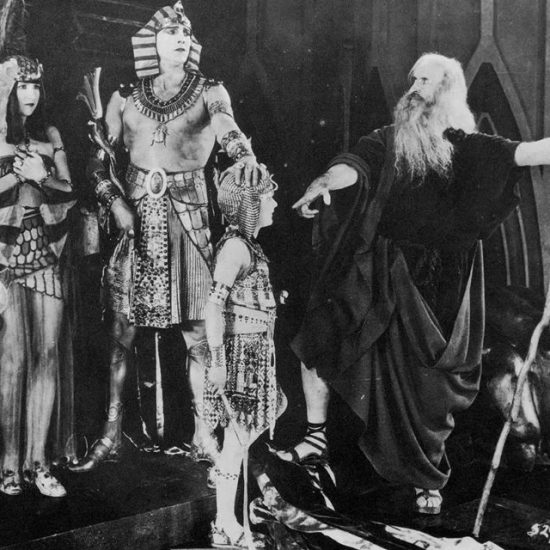
WASHINGTON (RNS) — Dozens of lawmakers and faith leaders gathered in the U.S. Capitol on Thursday (May 16) to celebrate the installation of a statue honoring evangelist Billy Graham, whose likeness will now represent his native North Carolina in the building’s Statuary Hall.

The Rev. Franklin Graham, son of the late Rev. Billy Graham, speaks after unveiling a bronze sculpture of his father in Statuary Hall at the U.S. Capitol in Washington, where it will stand on behalf of his native North Carolina, May 16, 2024. Known as America’s pastor, Graham died in 2018 at age 99. (RNS photo/Jack Jenkins)
House Speaker Mike Johnson, himself an evangelical Christian, spoke multiple times during the unveiling of the 7-foot tall bronze statue, which features Graham gesturing with one hand toward an open Bible in his other. Addressing the crowd of dignitaries, Johnson alluded to another statue gracing the Capitol: that of John Winthrop, who famously declared that the Massachusetts Bay Colony he founded in the 17th century could be a “city upon a hill” — a reference to Scripture.
“Our newest statue is a man who shares that same vision, and who believes that same gospel,” Johnson said. “A man who looks back at where we were, and prayed and served endlessly for what we could become again: that shining city upon a hill.”
Johnson noted that Graham, who died at age 99 in 2018, is one of only four people who have received all three of the highest honors Congress can offer: the Congressional Gold Medal, lying in honor at the Capitol and having a statue of their likeness erected in the building. The preacher, who once drew crowds of hundreds of thousands at his revivals or “crusades,” now joins the ranks of Presidents Gerald Ford and Ronald Reagan, as well as Rosa Parks.
Later in the program, Johnson noted that the Bible in the statue is open to Galatians 6:14: “May I never boast except in the cross of our Lord Jesus Christ, through which the world has been crucified to me, and I to the world.” The House speaker then grew visibly emotional as he lifted aloft Graham’s personal study Bible, its pages marked with handwritten notes, open to the same verse.
“This is the verse that Reverend Graham put on the banner of his life and in his final years,” Johnson said.

House Speaker Mike Johnson during an unveiling ceremony for a sculpture of the Rev. Billy Graham at the U.S. Capitol in Washington, where it will stand on behalf of Graham’s native North Carolina, May 16, 2024. (RNS photo/Jack Jenkins)
Graham’s statue replaces one of Gov. Charles Aycock, a North Carolina segregationist, which the state formally requested in 2018 be removed.
In his own address to the assembly, Graham’s son the Rev. Franklin Graham praised the inclusion of Scripture along the base of the statue — John 3:16 and John 14:6 — but said the sculpture would likely have made his father “a little uncomfortable.”
“He would want the focus to be on the one that he preached,” the younger Graham said. “He would want the focus to be on the Lord Jesus Christ, the Son of God.”
Another speaker, North Carolina Sen. Ted Budd, also referenced the Scripture passages along the bottom of the statue, and appeared to embrace the elder Graham’s evangelistic fervor.
“Friends, God’s grace is undeserved,” Budd said as he concluded his remarks. “But through righteousness, it is freely given and it is by trusting in Christ’s sacrifice, that we are saved. If you’ve not made that decision for yourself, I hope, I pray that you will.”
Multiple speakers pointed out that the process of establishing the statue took years, but Johnson noted that the artist who made it, Charlotte-based sculptor Chas Fagan, also fashioned a nearby likeness of Reagan.
“That’s pretty awesome,” Johnson said.
Other speakers included North Carolina Gov. Roy Cooper, who called Graham one of his state’s “finest treasures”; Sen. Thom Tillis; and Reps. Virginia Foxx and Patrick McHenry. Former Vice President Mike Pence and Sen. James Lankford of Oklahoma were also in attendance, as were evangelical leaders such as the Rev. John Hagee, head of Christians United for Israel, and Ralph Reed, founder of the Faith and Freedom Coalition.
But while those in attendance at the ceremony celebrated the statue, the news was met with criticism by some secular-minded advocates. Rachel Laser, who heads the group Americans United for the Separation of Church and State, argued that erecting a monument to a Christian evangelist in the U.S. Capitol was an inappropriate intrusion of faith into “the People’s House — a potent symbol of American democracy and its constitutional promise of church-state separation.”

A newly unveiled bronze sculpture of the Rev. Billy Graham in Statuary Hall at the U.S. Capitol in Washington, where it will stand on behalf of Graham’s native North Carolina, May 16, 2024. (RNS photo/Jack Jenkins)
Franklin Graham was dismissive of such criticisms in a conversation with reporters after the ceremony, saying “my father had critics all his life.” He also noted that his father is not the first faith leader to be represented in the Statuary Hall (a statue of Brigham Young, the second president of the Church of Jesus Christ of Latter-day Saints, stands a few feet away, representing Utah, and a sculpture of Fr. Junipero Sera, a controversial Catholic missionary, represents California and holds a cross aloft on the other side of the room).
He added: “Faith has been part of the foundation of this nation since it was first established.”
But for Laser, adding Billy Graham to the hall was inappropriate for other reasons as well. She pointed to the evangelist’s history of advocating against same-sex marriage, bringing Christianity into politics, and what she characterized as his inconsistency on civil rights — a reference to the fact that Graham, despite preaching racial tolerance, was at times dismissive of activists such as the Rev. Martin Luther King, Jr. and racial justice protests such as the March on Washington.
Laser also noted how controversy erupted when, in the diaries of a White House aide made public in 1994, Graham appeared to have made antisemitic remarks during a conversation with President Richard Nixon in 1972, such as discussing the “total Jewish domination of the media.” The preacher initially denied the claim, but the National Archives made a tape of the conversation public in 2002: In the recording, Graham can be heard saying Jews had a “stranglehold” on the media, as well as suggesting that if Mr. Nixon were re-elected “we might be able to do something.”
“I mean, not all the Jews, but a lot of the Jews are great friends of mine, they swarm around me and are friendly to me because they know that I’m friendly with Israel,” Graham said in the recording. “But they don’t know how I really feel about what they are doing to this country. And I have no power, no way to handle them, but I would stand up if under proper circumstances.”
Graham later publicly acknowledged that he made the remarks and apologized.
“Recognition in the U.S. Capitol’s Statuary Hall is a unique honor that should be reserved for those who most purely embody our American ideals of freedom and equality for all,” Laser said. “The late Rev. Billy Graham — with his history of advancing Christian Nationalism, making antisemitic statements, crusading against LGBTQ+ equality and a less-than-stellar record on civil rights for Black Americans — does not deserve this honor.”
Other organizations, such as the liberal-leaning advocacy group Faithful America, accused Graham of representing Christian Nationalism, as did the Freedom From Religion Foundation.
“As our nation faces unparalleled threats to our secular democracy,” Dan Barker, Co-President of the Freedom From Religion Foundation, said in a statement. “It’s unfortunate to see the personification of white Christian Nationalism given such an honored perch inside the seat of our democracy.”






